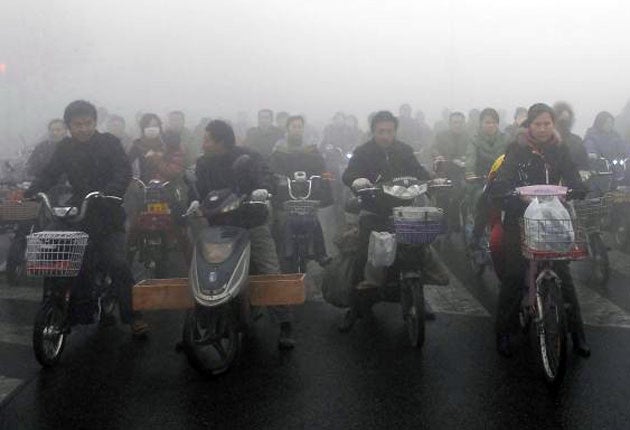China sets ambitious target on emissions
Beijing announces it will cut rate of carbon output growth by 40 per cent

China has galvanised the run-up to the climate change talks in Copenhagen by announcing an ambitious target to reduce its carbon footprint. It is the first time the world's biggest producer of greenhouse gases has committed itself to a reduction, and comes one day after the US announced its own target.
Taken together, these signals of intent by the world's two biggest producers give a powerful boost to the prospects for the talks. China said it will cut emissions of carbon relative to economic growth by 40 to 45 per cent by 2020 compared with 2005 levels.
Because its economy is still growing fast, this means that in absolute terms China's emissions will continue to rise fast for at least a decade. But for the first time China has agreed to slow the pace of growth of emissions.
"This is a voluntary action taken by the Chinese government based on its own national conditions and is a major contribution to the global effort in tackling climate change," the State Council said in a statement quoted by the Xinhua news agency yesterday. The announcement of the target came as Beijing was again clouded in smog, a grim reminder of the need for China to do something about its worsening environmental situation.
The leadership in Beijing is increasingly aware of the need for China to cut its carbon emissions, especially given the country's heavy reliance on expensive, and dirty, coal.
Coal accounts for 69 per cent of primary energy in China, 42 per cent higher than the world's average. The country is forced to live with the consequences of burning fossil fuels: smoggy skies, worsening typhoons, desertification and melting glaciers. But environmental groups said they fear the measures announced by China may be too little to stop the worsening climate change crisis.
"Given the urgency and magnitude of the climate change crisis, China needs stronger measures to tackle climate change," said Ailun Yang of Greenpeace China. "This is a significant announcement at a very important point in time. But China could do more."
Beijing also announced that Prime Minister Wen Jiabao will attend the Copenhagen conference that starts on 7 December.
He and US President Barack Obama are among 66 global leaders expected to try to hammer out an agreement on the framework for a final accord to replace the 1997 Kyoto Protocol, which expires in 2012.
Thus far, there has been little optimism about the prospects for the talks, and a vague framework document was looking the most likely outcome. But the news from China and the US has brightened hopes of the emergence of some kind of deal.
The US, which China recently overtook as the world's largest air polluter, said it will bring to Copenhagen an offer to reduce emissions by about 17 per cent for the same period.
The negotiations ahead of the talks have been characterised by disagreements between the rich countries and developing nations over issues such as targets for emission cuts, and the amount that the rich countries should provide to the developing world to fund climate change programmes.
China's first pledge to cut what it calls "carbon intensity" came in September, though without specifics. China defends its emissions output by saying that it is a developing country and that it should be up to developed countries to do more to cut their carbon output.
Beijing authorities argue that rich countries such as the US, Japan and Germany are responsible for 80 per cent of the carbon-dioxide pollution currently in the atmosphere.
China has been very publicly promoting its efforts to develop sustainable energy sources, such as solar and wind power. Beijing has set a target of generating 15 per cent of all electricity from renewable sources by 2020. Sustainable energy accounts for around 9 per cent of the total, up from 7.5 per cent four years ago.
69%
The proportion of China's primary energy generated from coal.
Join our commenting forum
Join thought-provoking conversations, follow other Independent readers and see their replies
Comments
Bookmark popover
Removed from bookmarks